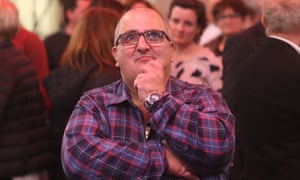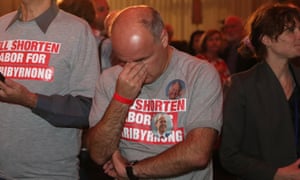Extract from The Guardian
Labor supporters came to Essendon Fields to celebrate victory but
left with emotions raw and painful after Bill Shorten conceded defeat
What
happened? Labor supporters gathered at the Hyatt Place Melbourne hotel
at Essendon Fields for a celebration, a victory party. They were nervous
but quietly confident. As the night wore on, it turned into a wake,
heads in hands, confused faces.
At 6.30pm, Andrew Philippou, 62, was clutching a spreadsheet of the lower house seats. He’d worked it out, ticked off Labor wins, and predicted the ALP would win at least 80, a comfortable victory. “Easy,” he said. He wasn’t over-confident, but he was smiling. “Let’s see how we go.”
By 9pm, Philippou was still clutching his piece of paper. “I am gutted.”
“Greed wins over hope. People didn’t want to lose their franking credits, people didn’t want to lose negative gearing. People didn’t want to share their wealth with anyone else.”
It was too early for sober analysis, but Bill Shorten, when he finally appeared on stage at 11.35pm, tried to make sense of it. He looked weary, disappointed, but he spoke with grace, his voice often inflecting downwards, almost like a sermon.
At 6.30pm, Andrew Philippou, 62, was clutching a spreadsheet of the lower house seats. He’d worked it out, ticked off Labor wins, and predicted the ALP would win at least 80, a comfortable victory. “Easy,” he said. He wasn’t over-confident, but he was smiling. “Let’s see how we go.”
By 9pm, Philippou was still clutching his piece of paper. “I am gutted.”
“Greed wins over hope. People didn’t want to lose their franking credits, people didn’t want to lose negative gearing. People didn’t want to share their wealth with anyone else.”
It was too early for sober analysis, but Bill Shorten, when he finally appeared on stage at 11.35pm, tried to make sense of it. He looked weary, disappointed, but he spoke with grace, his voice often inflecting downwards, almost like a sermon.
“I know that you are all hurting, and I am too,” he said, holding the lectern with both hands, his wife, Chloe, by his side. Labor could not win majority government – “Shame! Shame!” roared the crowd – and so in the national interest he had conceded to Scott Morrison. He would not be standing to be leader of the Labor party again.
“This has been a tough campaign, toxic at times. But now that the contest is over, all of us have a responsibility to respect the result, respect the wishes of the Australian people and to bring our nation together.”
He wished Labor had won for Australians who counted on a reforming government. He wished it had won for the trade union movement.

For the hundreds here, this was a bewildering night. Supporters believed Labor would win after six years in opposition. Opinion polls and most political observers consistently predicted a Labor victory, either narrow or comprehensive.
The “pathway” to victory for the Coalition was supposed to be too narrow. The progressive state of Victoria would be crucial, overcoming possible losses in Queensland. This was the climate change election, wasn’t it? This was about generational change. This was the election which would usher in a new active purpose for government.
None of that happened, and understanding why will take weeks to work out. For the Labor faithful, the first emotions were raw. “What happened?” asked Tiani Rutledge-Wilkes, an interior designer, who said she had no idea what had gone wrong. She thought the ALP would win, and had her nails painted “Labor red” for the occasion. “What have we misread?”
“It’s just not the polls [that got it wrong] but all the experts.”
Tim Wilkes, who works in banking, chimed in. In Victoria, “They had their protest vote with the Victorian election, and we have moved on. The instability issue hasn’t come through.”
This was a crushing loss. Labor believed it had proved itself worthy after the instability of the Rudd-Gillard years. The frontbench team were united. They had done the policy work, and had been honest with the Australian people about their redistributive agenda. They knew it was risky for an opposition to outline such an ambitious program but it was bold and the times would suit Labor. The government was hopeless and riven by ideological division, they thought. The people in the room felt good about their party and somehow betrayed by the result.
There were moments of joy, a big cheer when the ABC announced that Tony Abbott had lost Warringah to the independent Zali Steggall. “You’re gone!” they shouted. They enjoyed booing Peter Dutton, who held his seat of Dickson in Queensland. But the cathartic moments were rare. There was a small swing in Victoria, about 1.7%, but not enough to win the seats expected. By 11pm, Labor had picked up just a single seat, Gilmore in New South Wales. It won Corangamite and Dunkley in Victoria, but redistributions had already made them notionally Labor.

At 9.02pm, the ABC’s Antony Green was saying on the big screen that it was “very hard for Labor to possibly win government from here”. It would be a Coalition victory or perhaps a minority Coalition government. The people in the room weren’t quite ready to give up, still hoping that perhaps Labor could form a minority government.
No one wanted to criticise Shorten too harshly, not now. One state MP mused that this was like 1993, when John Hewson lost the “unloseable” election for the Coalition. Others said the country was now hopelessly divided, and wondered whether issues such as the climate emergency had the power they believed it had.
Philippou said this election was “a win for the Murdoch media, they will be sipping champagne”. But there was little bitterness. He was willing to say that Shorten reminded him of former Victorian leader John Brumby, a competent minister with policy strength but who did not win an election.
Shorten’s personal unpopularity has dogged the leader for his six years in the job. “Shorten lacks the X-factor. He doesn’t have that warmth. Morrison has the salesman approach; he knows how to work a room …
“The issue now is, who have we got?”
That will be for another day. As for Shorten, never a great orator, he left the stage without rancour. At the 2016 election, Labor’s election party was joyous, even though they didn’t win. Shorten performed much better than expected, and the party could taste victory next time. In 2019 Shorten was expected to win, and did not. Politics is harsh, and Shorten said he could look himself in the eye and know he did all he could.
“I am not disappointed for me,” he said. “I’m proud we argued for what was right, not what was easy.”
No comments:
Post a Comment